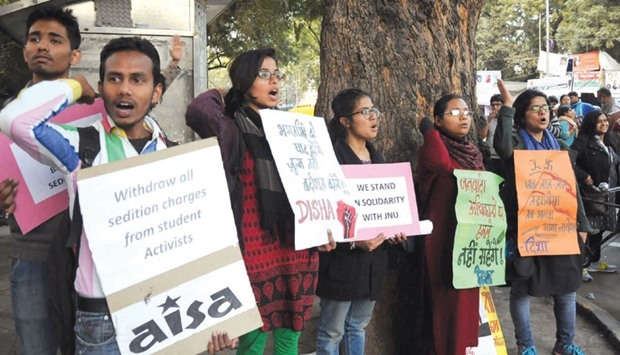Protests snowballed yesterday at the Jawaharlal Nehru University (JNU) in the Indian capital, days after its student union president was arrested on charges of sedition and at least seven others detained.
Students and teachers of the university came out in large numbers to march across the campus criticising the federal Bharatiya Janata Party (BJP) government for what they termed infringing on the autonomy of the university.
Home Minister Rajnath Singh said the controversial protest on February 9 during which slogans against the government and the country were allegedly raised may have terrorist links.
“What happened at JNU was fully supported by Lashkar chief Hafiz Saeed. I appeal to all political parties that whenever such situations arise where anti-India slogans are raised, the entire nation must speak in one voice,” Singh said.
India holds the Pakistan-based militant group Lashkar-e-Taiba responsible for several terrorist attacks on India including the one on its financial hub Mumbai in 2008 that left 166 people dead.
JNU students’ union president Kanhaiya Kumar was arrested on Friday after a lawmaker of the ruling BJP complained to the police that students at a function to mark the hanging of Afzal Guru had allegedly shouted anti-national slogans.
Guru was hanged on February 9, 2012, for an attack on the Indian parliament in which 14 people were killed. Civil rights activists say Guru was not given a fair trial.
Harshit Agrawal, a student who was present on the occasion, said there were also some young Kashmiri men present who were not students of JNU and they were the ones who shouted the slogans.
Police are probing the case, but has sought a transfer to the Special Branch, saying that as there were charges of sedition, a terror link could emerge.
“The university had already instituted an inquiry into the incident to ascertain the facts and take necessary action and the police action was totally uncalled for,” Ajay Patnaik, a member of the JNU teachers’ association said.
“It has only aggravated the situation and it goes against the autonomy of the university,” Patnaik added.
The controversial function was held despite university authorities refusing permission.
Members of the Akhil Bharatiya Vidyarthi Parishad (ABVP), a students’ union affiliated to the BJP, have been demanding that the students indulging in anti-national activities should be punished.
Meanwhile, legal experts said the sedition charge against Kumar cannot stand test of the law, and expressed surprise that the government was routinely slapping the measure against whosoever raises voice against it.
The sedition charge prescribes a jail sentence from three years to life imprisonment for “whoever, by words, either spoken or written, or by signs, or by visible representation, or otherwise, brings or attempts to bring into hatred or contempt, or excites or attempts to excite disaffection towards the government established by law in India”.
Activist lawyer Prashant Bhushan said the offence of sedition could be established only if there is an incitement of violence or public disorder.
“Mere raising of the slogans, even against the country or against the state cannot amount to sedition, though it is objectionable,” he said.
Another senior advocate Kamini Jaiswal regretted that the government was taking a very easy way out by levelling sedition charges against anybody who raises voice against it.
Describing the arrest of Kumar as shameful, Jaiswal said it only goes to show “how insecure” the present government is. “It is an outdated law and all those believing in fundamental rights should press for dropping section 124-A from the Indian Penal Code (IPC) introduced by the British to haul up those engaged in the Independence movement.”

Activists of the All India Students’ Association stage a demonstration demanding that sedition charges against JNU Students Union president Kanhaiya Kumar be dropped, at Jantar Mantar in New Delhi yesterday.
